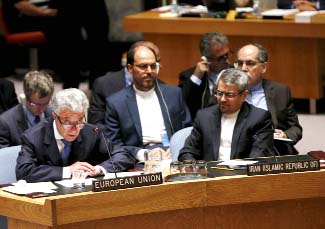
Reuters, Dubai :
Iran will not accept any extension of sanctions beyond 10 years, an official said on Wednesday, in the latest attempt by its pragmatist government to sell a nuclear deal with world powers to skeptical hardliners.
Abbas Araqchi, one of several deputy foreign ministers, also told a news conference Iran would do ‘anything’ to help allies in the Middle East, underlining Tehran’s message that despite the deal Iran will not change its anti-Western foreign policy.
Ayatollah Ali Khamenei, the highest authority in Iran, told supporters on Saturday that U.S. policies in the region were “180 degrees” opposed to Iran’s, in a Tehran speech punctuated by chants of “Death to America” and “Death to Israel”.
Under the accord, Iran will be subjected to long-term curbs on its nuclear work in return for the lifting of U.S., European Union and U.N. sanctions. The deal was signed by the United States, Britain, China, France, Germany, Russia and the EU.
The world powers suspected Iran was trying to create a nuclear bomb; Tehran said its program was peaceful.
The accord was a major success for both U.S. President Barack Obama and Iran’s pragmatic President Hassan Rouhani. But both leaders have to promote it at home to influential hardliners in countries that have been enemies for decades.
Araqchi, Iran’s senior nuclear negotiator, told the televised conference that any attempt to re-impose sanctions after they expired in 10 years would breach the deal.
He was referring to a resolution endorsing the deal passed by the U.N. Security Council on Monday.
The resolution allows all U.N. sanctions to be re-imposed if Iran violates the agreement in the next 10 years. If Iran adheres to the terms of the agreement, all the provisions and measures of the U.N. resolution would end in 10 years.
However, the six world powers, known as the P5+1, and the European Union told U.N. Secretary-General Ban Ki-moon earlier this month that after 10 years they planned to seek a five-year extension of the mechanism allowing sanctions to be re-imposed.
Araqchi challenged this move, saying: “Our priority is our national interests, not UN Security Council’s resolutions.”
“The U.N. Security Council’s resolution says clearly that the timeframe of agreement is 10 years, and Iran’s case will be closed in the Security Council after that,” Araqchi said.
Dawn report adds: The US Congress began a review of the nuclear deal with Iran on Tuesday amid a warning by Secretary of State John Kerry that the United States would lose “all credibility” if Congress or a future president reversed the agreement.
In an interview with the National Public Radio, Secretary Kerry said that if Congress did not approve the deal, which six major powers signed with Iran last week, the consequences would be disastrous. “I’m telling you, the US will have lost all credibility.” In an earlier interview, he told lawmakers that there was no alternative to the agreement he signed in Vienna on July 14.
Iran will not accept any extension of sanctions beyond 10 years, an official said on Wednesday, in the latest attempt by its pragmatist government to sell a nuclear deal with world powers to skeptical hardliners.
Abbas Araqchi, one of several deputy foreign ministers, also told a news conference Iran would do ‘anything’ to help allies in the Middle East, underlining Tehran’s message that despite the deal Iran will not change its anti-Western foreign policy.
Ayatollah Ali Khamenei, the highest authority in Iran, told supporters on Saturday that U.S. policies in the region were “180 degrees” opposed to Iran’s, in a Tehran speech punctuated by chants of “Death to America” and “Death to Israel”.
Under the accord, Iran will be subjected to long-term curbs on its nuclear work in return for the lifting of U.S., European Union and U.N. sanctions. The deal was signed by the United States, Britain, China, France, Germany, Russia and the EU.
The world powers suspected Iran was trying to create a nuclear bomb; Tehran said its program was peaceful.
The accord was a major success for both U.S. President Barack Obama and Iran’s pragmatic President Hassan Rouhani. But both leaders have to promote it at home to influential hardliners in countries that have been enemies for decades.
Araqchi, Iran’s senior nuclear negotiator, told the televised conference that any attempt to re-impose sanctions after they expired in 10 years would breach the deal.
He was referring to a resolution endorsing the deal passed by the U.N. Security Council on Monday.
The resolution allows all U.N. sanctions to be re-imposed if Iran violates the agreement in the next 10 years. If Iran adheres to the terms of the agreement, all the provisions and measures of the U.N. resolution would end in 10 years.
However, the six world powers, known as the P5+1, and the European Union told U.N. Secretary-General Ban Ki-moon earlier this month that after 10 years they planned to seek a five-year extension of the mechanism allowing sanctions to be re-imposed.
Araqchi challenged this move, saying: “Our priority is our national interests, not UN Security Council’s resolutions.”
“The U.N. Security Council’s resolution says clearly that the timeframe of agreement is 10 years, and Iran’s case will be closed in the Security Council after that,” Araqchi said.
Dawn report adds: The US Congress began a review of the nuclear deal with Iran on Tuesday amid a warning by Secretary of State John Kerry that the United States would lose “all credibility” if Congress or a future president reversed the agreement.
In an interview with the National Public Radio, Secretary Kerry said that if Congress did not approve the deal, which six major powers signed with Iran last week, the consequences would be disastrous. “I’m telling you, the US will have lost all credibility.” In an earlier interview, he told lawmakers that there was no alternative to the agreement he signed in Vienna on July 14.

